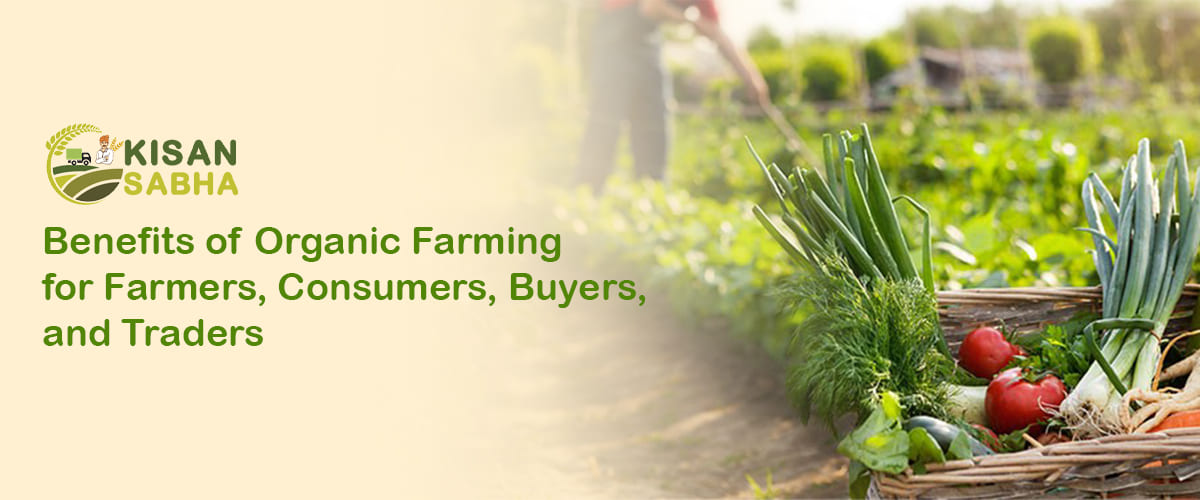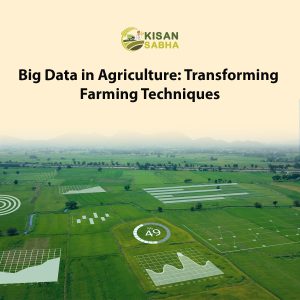Organic farming has arisen as a beacon of hope in an age of increased knowledge about the environment, health, and sustainability. This agricultural system is about more than just providing food; it is also about caring for the environment, improving human well-being, and guaranteeing equitable commerce. This essay will look at the several advantages of organic farming for farmers, consumers, purchasers, and traders.
Benefits for Farmers
Organic farming is a boon to the agricultural community, providing a myriad of advantages that enhance their livelihoods and well-being:

- Soil Health:- Organic farming relies on natural processes to nourish the soil. By avoiding synthetic chemicals, it promotes soil health, reduces erosion, and prevents degradation. Farmers practicing organic agriculture witness improved soil structure, nutrient content, and overall fertility.
- Economic Viability:- Although transitioning to organic farming can be challenging initially, it pays off in the long run. Farmers often experience lower input costs, as they reduce or eliminate the need for expensive synthetic pesticides and fertilizers. Moreover, organic products typically fetch premium prices, leading to increased profitability.
- Crop Resilience:- Organic farming encourages crop rotation and diversification, reducing the risk of pest and disease outbreaks. This resilience is particularly crucial in an era of climate change, where extreme weather events are becoming more frequent.
- Reduced Health Risks:- Farmers working with organic methods face fewer health risks than those using synthetic chemicals. The absence of toxic pesticides and herbicides in organic farming contributes to a safer and healthier working environment.
- Sustainable Farming Practices:- Organic farming fosters sustainable agriculture, emphasizing practices that protect the environment and conserve resources. Farmers adopting these methods become stewards of the land, preserving it for future generations.
Also Read:- Automation and Artificial Intelligence in Vertical Farming
Benefits for Consumers
Organic farming extends its positive impact on consumers by offering healthier and more nutritious food options:
- Nutrient-rich Foods:- Organic products are often richer in essential nutrients, such as vitamins, minerals, and antioxidants. Research has shown that organic fruits and vegetables can contain significantly higher levels of beneficial compounds.

- No Harmful Chemicals:- One of the primary benefits for consumers is the absence of synthetic chemicals in organic foods. These products are free from toxic pesticides, herbicides, and genetically modified organisms, reducing the risk of pesticide residues in the diet.
- Better Taste:- Many consumers argue that organic foods taste better than their conventionally grown counterparts. This is attributed to healthier soils, which produce more flavorful and aromatic crops.
- Environmental Preservation:- By supporting organic farming, consumers are indirectly contributing to environmental conservation. This method of agriculture reduces pollution, conserves water, and protects biodiversity, creating a healthier planet for all.
- Ethical Consumption:- Many consumers appreciate the ethical aspects of organic farming, including the humane treatment of animals and sustainable farming practices. This aligns with the values of individuals who prioritize ethical food production.
Benefits for Buyers
The advantages of organic farming extend to buyers, which can include grocery stores, restaurants, and food distributors:
- Premium Market:- Organic products often command higher prices in the market, which can translate into increased profits for buyers. The willingness of consumers to pay a premium for organic items creates an appealing niche market.
- Competitive Advantage:- Retailers who stock organic products can differentiate themselves in a crowded marketplace. Being associated with organic goods can attract environmentally conscious and health-conscious customers.
- Meeting Consumer Demand:- As consumer demand for organic products continues to rise, buyers who offer organic options can meet the preferences of a growing segment of the market. This demand helps secure a steady stream of customers.
- Regulatory Compliance:- Buying organic products ensures compliance with stringent organic certification standards, which can build trust with customers and regulatory bodies.
- Sustainability Initiatives:- Incorporating organic items into product offerings aligns with sustainability goals and corporate social responsibility (CSR) initiatives. It demonstrates a commitment to environmentally friendly and socially responsible business practices.

Also Read:- The best crops for small farms
Benefits for Traders
Traders, such as exporters and importers, also reap several advantages from organic farming:
- Expanding Markets:- Organic products have gained popularity in international markets. Therefore traders dealing in organic goods can access a broader customer base and explore new export opportunities.
- Positive Reputation:- Traders who focus on organic products can establish a reputation for quality and sustainability. However, this can enhance their credibility and attract long-term partnerships.
- Certification and Standards:- Dealing with organic products necessitates adherence to specific standards and certifications, which can streamline trade operations by ensuring product quality and transparency.
- Value Addition:- Premium prices often offer higher value for organic products, increasing profit margins for traders and making them a lucrative business proposition.
- Environmental Responsibility:- Traders involved in organic products play a role in supporting environmentally responsible supply chains. This resonates with customers, reinforcing the idea of ethical and sustainable trade practices.
Conclusion
Organic farming is a comprehensive approach to agriculture that helps farmers, customers, purchasers, and dealers. Farmers benefit from increased soil health and economic viability, while consumers benefit from healthier, more nutritious food. Buyers get access to premium markets and competitive advantage, while traders gain access to expanding markets, establish great reputations, and contribute to ecologically responsible commerce. However, organic farming is a paradigm that enhances people and sustains the earth in a world where sustainability, health, and ethical concerns are gaining popularity.





